Since 2018, the Ukrainian Institute London and Ukrainian Jewish Encounter have partnered to co-host a number of events examining Jewish aspects of Ukrainian culture and history. Events have ranged from talks, to screenings, and journal launches.
Below you can find out more about our collaboration with Ukrainian Jewish Encounter by reading a little about the events we have hosted.
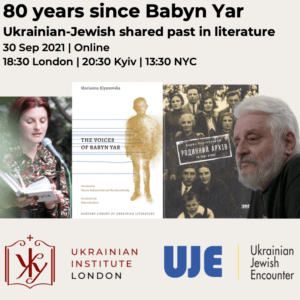
Commemorating the 80th anniversary of the Babyn Yar massacre and exploring literary representations of the Ukrainian-Jewish past.
Together with two leading Ukrainian poets, Marianna Kiyanovska and Borys Khersonskyi, and the Head of the Ukrainian Institute of National Memory, Anton Drobovych, we will talk about literary representations of Babyn Yar, the site where over 100,000 people were murdered in 1941, including over 33,000 Kyiv Jews, and the memory of the Shoah in Ukraine today. The speakers will discuss cultural representations of the shared past of Jews and Ukrainians, and what it means for poets to bear witness and give voice to those who have been silenced. The event will include poetry readings (in English and Ukrainian).
The discussion was held in Ukrainian with simultaneous interpretation into English.
This event was co-organised by the Ukrainian Jewish Encounter.
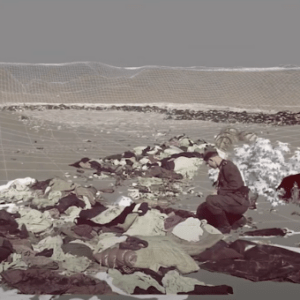
Ukraine has witnessed a renewed focus on the commemoration of the Babyn Yar tragedy, the site of the mass murder of thousands of people, mainly Jews, in 1941-42 in Nazi-occupied Kyiv. A privately-funded initiative – the Babyn Yar Holocaust Memorial Centre (BYHMC) – supported by Russian, Ukrainian, and American businessmen of Jewish descent, has driven an ambitious project around Babyn Yar. Ukraine’s civil society raised concern about the lack of agency Ukraine has in this project, and the shift towards experimental curatorial work by new artistic director, film-maker Illia Khrzhanovsky. The approach has been criticised by Ukraine’s artistic and intellectual community, which signed an open letter demanding Khrzhanovsky resign. In the midst of controversy, is consensus around BYHMC possible?
The panel was supported by the Ukrainian-Jewish Encounter.
This event was held in English.
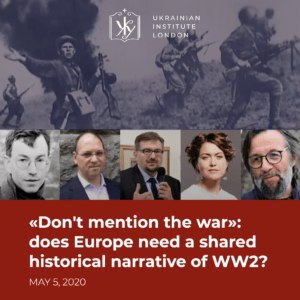
As Europe is to mark the 75th anniversary of the end of WW2, national narratives of those historic events hugely differ across Europe. Identity and historical memory are often hijacked by populist and nationalist agendas and history. In Brexit Britain, spurious references were made to get rid of “German” control. In Putin’s Russia, the “Great Patriotic War” has been made a centrepiece of contemporary Russian identity, justifying aggression as a crusade against “Ukrainian fascists.” The lack of a shared vision of lessons from WW2 hampers understanding of the Holocaust and the industrial-scale that it took in the lands squeezed between Hitler and Stalin.
The Ukrainian Institute London, Ukrainian Jewish Encounter, and Henry Jackson Society jointly presented this outstanding panel discussion.
This event was held in English.
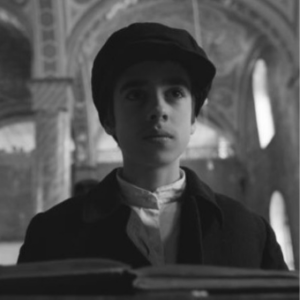
In the Synagogue is a fascinating short film by young Ukrainian director Ivan Orlenko based on an unfinished story by Franz Kafka. One of few works by Kafka to deal with Jewish culture overtly, the story describes a strange vision of a beast that a Jewish boy experiences while praying in a synagogue. One of Ukraine’s brightest young directors, Orlenko, has adapted Kafka’s fragment into a 30-minute film, shot entirely in Yiddish, and transposed its action to a synagogue in western Ukraine.
The screening will be preceded by a talk by Dr Uilleam Blacker of UCL SSEES on the ways in which the rich Jewish cultural heritage of Ukraine is remembered and reimagined in the country today, and the challenges which this process of recovery faces. The screening will be followed by a discussion with the director.
The event was co-organised by Ukrainian Institute London and UCL SSEES, with the support of Ukrainian Jewish Encounter.
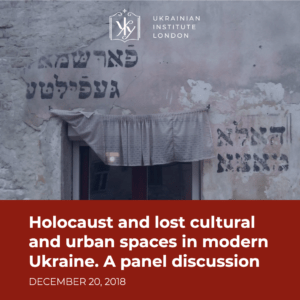
Ukraine is home to thousands of cities and villages – borderland communities – contested by empires, occupying a central place in their colonisation projects. Subjected to multiple occupations throughout WW2, many of them have experienced a near-complete change in their populations. One such city is Lviv; once predominantly Polish and Jewish, it is now overwhelmingly Ukrainian and an important centre of Ukrainian identity.
Cities like Lviv are now coming to grapple with their complex and tragic history: trying to fill the gaping void of lost cultural landscapes, and coming to terms with the trauma of the lost communities.
This event was held in partnership with Jewish Community Centre JW3 and funded by Ukrainian Jewish Encounter.
Moderated by Marina Pesenti, Director of Ukrainian Institute London.
This event was held in English.
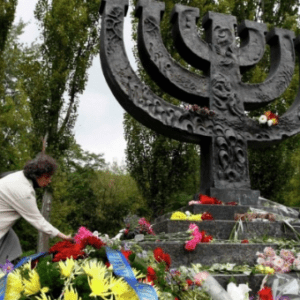
A new Ukrainian identity project is underway, taking the experiences and histories of all who live on Ukrainian soil. How does Ukraine’s Jewish community fit into this mosaic and what is the significance of a new term for this community,” Ukrainian Jews? What is the role Jews play in contemporary Ukraine? What are the outcomes of the official politics of memory in today’s Ukraine? And what should we make of conflicting reports about Ukraine’s antisemitism?
The event was held in partnership with Jewish Community Centre and supported by Ukrainian Jewish Encounter.
This event was held in English.
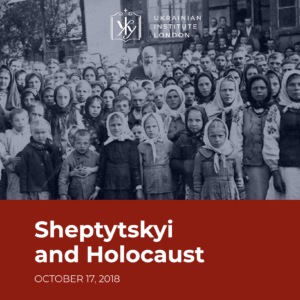
Andrei Sheptytsky, the Metropolitan Archbishop of the Ukrainian Greek Catholic Church, is an extraordinary figure among Christian church hierarchs of the 20th century. He presided over the Church under the Nazi occupation of Galicia during WW2. Despite having saved the lives of 150 Galician Jews, Metropolitan Sheptytsky has not been recognized as a Righteous Among the Nations.
This event was supported by the Ukrainian Jewish Encounter, an organization striving to promote the Ukrainian-Jewish dialogue. The organization has long campaigned to highlight Sheptytsky’s achievements.
Marina Pesenti, Director of Ukrainian Institute London, moderated this event. The Institute would like to thank the London Eparchy of the Ukrainian Greek Catholic Church for providing a venue for this event.
This event was held in English.
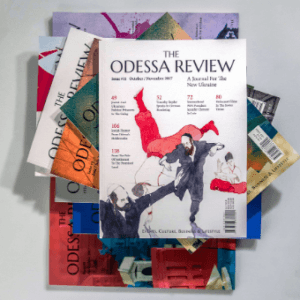
For many centuries, Ukrainians and Jews lived together on the same land. The history of their cohabitation has had many difficult moments and the twentieth century was marked by tragedy for both peoples. But alongside the history of conflict, there were many moments of cooperation and cultural cross-fertilization. Ukrainian writers and journalists often turned to Jewish themes, while Jewish writers and politicians often discussed Ukrainian issues. The recent conflict between Russia and Ukraine has brought the questions of historical memory back to the forefront and settled issues of historical memory have been politicized once more.
Moderated by Marina Pesenti, Director, Ukrainian Institute London.
This event and the special issue of Odessa Review were supported by Ukrainian Jewish Encounter.
This event was held in English.
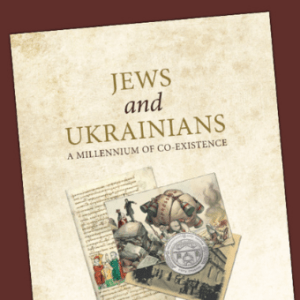
There is much that ordinary Ukrainians do not know about Jews and much that ordinary Jews do not know about Ukrainians. As a result, those Jews and Ukrainians who may care about their respective ancestral heritages usually view each other through distorted stereotypes, misperceptions, and biases. This book sheds new light on controversial moments of Ukrainian-Jewish relations and argues that the historical experience in Ukraine not only divided ethnic Ukrainians and Jews but also brought them together.
Professor Magoczi delivered a talk, in conversation with Dr Brendan McGeever of the Pears Institute for the study of Antisemitism, Birkbeck.
The book’s publication and the event were supported by Ukrainian Jewish Encounter. Marina Pesenti, Director of Ukrainian Institute London, opened the event.
This event was held in English.